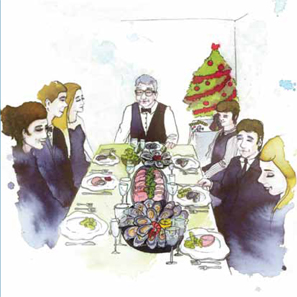When the French are less French
This is the installment that our French hosts, cousins, counterparts, entourage have dreaded. When the French are less French. (We offer it, however, with tender feelings, hoping that will matter.) For years, FUSAC’s Hints for Newcomers–Hindsights for Oldtimers column has explored Anglo-French cultural and linguistic differences, the behavior and words that separate Parisians from Peorians, Niçois from New Yorkers, Cabourgais from Clevelanders. But while some of those differences are so profoundly embedded in millennia of national identity as to seem eternally immutable, others have begun melting away. Blame globalization. Blame the ubiquitousness of U.S. TV series. Blame students sent on exchange programs and executives sent on voyages d’affairs. Blame the “cool” appeal of Anglo jargon or the difficulty of fitting French verbosity into 140 characters. Whatever the reason, here is a (merely) four-category list of evidence that the gaping gulf is starting to close:
- WHAT THEY’RE SAYING: Someone once asked François Mitterrand (1916-1996), Est-ce qu’on peut se tutoyer (Can we address each other with the informal tu)? Si vous voulez (If you wish), was the president’s brilliantly shrewd answer, employing the formal vous as a way of saying no by saying yes! While much of the political class and their contemporaries in other fields continue to recoil in horror at the thought that the vous-tu status/age/class/emotional-proximity barrier could ever come crashing down, members of the younger generation are increasingly enjoying informality à l’anglo-saxone, even tutoying peers they’re meeting for the first time! (It would still be unthinkable to tutoyer an elder or a professional superior.) And while they’re busy chumming up to you personal-pronoun-wise, these Génération Yers will tell you that the source of this linguistic upheaval is less Desperate Housewives than desperate downloaders: familiarity born in the leveling effect of online forums and chatrooms and helpdesks too rushed and overloaded, too hip and laid-back to bother with archaic politesse.
-

WHAT THEY’RE WEARING: Remember the days when an Anglo in clunky running-shoes would get on a crowded métro and every pair of eyes would be suddenly and violently aspirated in the direction of said footwear, as if the rider were wearing giant tarantulas on her feet? The needle on the inelegance meter would climb so high as to seemingly set off a screeching alarm. Well, you can go back to your word-search puzzles, fellow passengers. We’re all insect wearers now. True, the sneakers tend to be a bit more snazzy in Paris (gold lamé appears to be a choice du jour), but the fact that they’re beginning to be worn with change-into-heels-once-I-get-to-the-office* business suits is nothing short of a sartorial revolution!
- WHAT THEY’RE EATING: In our courses on French civilization all those years ago, little was more intriguing or appealing than the concept of the two-hour lunch. Yes, that meant staying later at the office. Yes, that meant coming to a Road-Runneresque screeching halt in the middle of crucial late-morning deliberations. But, aaaahhhhhh: the two-hour lunch. “WHAT two-hour lunch?” you might ask. And you would be right to do so. It’s not only the crunch of la crise (the financial-economic crisis on everyone’s lips) that is beckoning workers back to the cubicle or even the executive suite before the waiter can wheel the dessert wagon their way. It’s also the kind of time management that will allow them to stop off at the gym at the end of the day and still get home in time to relieve the nanny–a concept grandma would not have even imagined, let alone embraced.

- Speaking of whom, WHO THEY’RE (NOT) VISITING: About three decades ago a French colleague shuffled slump-shouldered into my Paris office. The look on his face was Nuclear Arms Negotiator meets Convicted Assassin. Splatting anxiously into the seat I offered him, he stared off into the distance for a while before confessing in an unsteady voice that he had just done something deeply, deeply serious, with far-reaching impacts on his life. Murder, I thought. Noprobably just divorce. Embezzlement, maybe. I looked into his somber eyes. Way worse than embezzlement. I was just about to suggest some unspeakable sex-crime when he blurted out, “I’ve decided that maybe someday I won’t go visit my grandparents every Sunday.” With a straight face. That’s what he blurted out. The descendants of Australian, New Zealand, Canadian and American colonists, pilgrims and immigrants don’t visit grandma on Sunday with such allegiant automatism because, for the younger ones, they left grandma back in the old country figuratively, and for the older ones, they may have left her back there literally. It’s about the future, not the past. And today’s young French families seem to be peeking through the peephole of the future as well, daring to guiltlessly abandon a tradition that while heavy on the home-cooked cassoulet, juicy family gossip and adorable gang snapshots, comes up a bit short in the breathing-room department.
* That trend is said to have emerged during the New York transit strike of 1980, when women from surrounding boroughs were forced to walk miles to their Manhattan offices.
Shari Leslie Segall is a writer who lives in Paris.
Illustrations for this article are from the book 90+ Ways You Know You’re Becoming French
(Less French)


